The TV and film industries rarely display deaf characters.
Which is why it’s quite exciting to see that a popular soap programme in the UK, Eastenders, on the BBC has dedicated an entire episode from the perspective of a character who has lost his hearing.
And with the help of the right people in the background, they have managed to pull-off a very good episode that perfectly demonstrates the challenges and barriers that most, if not all, deaf and hard of hearing people face.
You can learn about my reactions after I watched the episode in the video below…
…listen to the podcast…
…or read the transcript below.
This is a big deal! I mean, it’s a big deal to me anyway, but I hope it will resonate with a lot of people because this is a rare opportunity for everyone, at least in the UK, maybe abroad, to see what is it like to live the life of a deaf person.
But it’s done via prime time TV in the most popular, one of the most popular programmes in the UK, a soap programme called Eastenders.

Basically, what they did is they have done an episode following a character called Ben and he has lost his hearing in an accident. I don’t know the full story, I don’t watch any soap programmes, it’s not my thing.
But I was very curious about this one because he lost his hearing in an accident and then in this particularly episode, it is literally following his point of view.
And you follow his story line and what he’s feeling, what is he hearing, if anything at all, how is he feeling, it’s done to the minute detail. And it resonated with me a lot and I just want to talk about it and share that with you.
It’s a big deal because it’s just not really something you see on TV, at least not on prime time TV. It’s shown to everyone who watches this programme, millions of people in the UK watches Eastenders. And the fact that they’re doing this, it’s literally like a deaf awareness project and it’s shown people what is it like.
I’m just going to assume, and I think it will be, most likely, that the majority of their viewers are hearing. And there are really very little deaf representation on TV, if at all, I barely see it. And I know there are programmes in the US, there are some programmes around that topic, but it’s not available in the UK as much.
But now it’s available, it’s like one episode, it’s not changing everything, hopefully there’ll be more, but for that one episode, they’ve done it and they followed that person.
Before getting into it, make sure you hit the subscribe button and like if you enjoy this kind of topic. And if you want me to do more of this reaction videos on certain things, like I said, hit that subscribe button, hit that like button and let’s get into the topic.
1. Creative open-captioning
Number one would be that they were very creative in the use of open captions. And what I mean by that is the captions are burned on the video, you can’t switch them on and off, that is close-caption.
But they put open-captions in there to illustrate what are the few words that Ben, the character, can hear when the other people are speaking and it’s very little.
So imagine a whole sentence and the open caption is displaying only a few words and that is what Ben can hear.
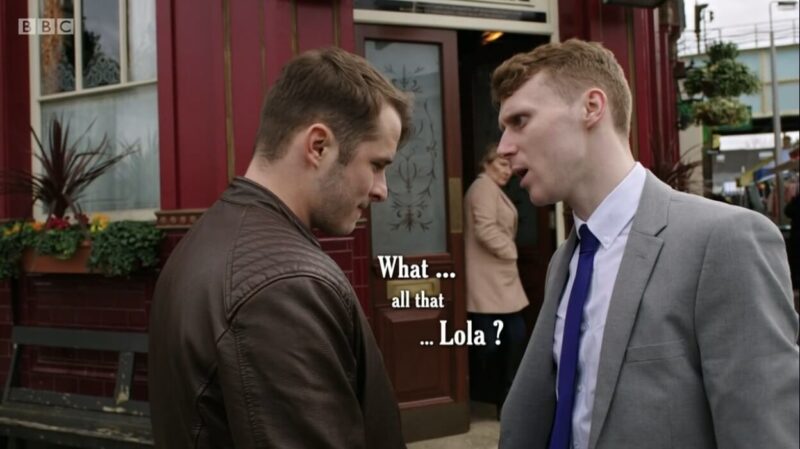
It’s trying to show you that when people are listening hard and if people are lip reading, you’re only picking up around, maybe, 30% approximately of what that person is saying, you pick up the pieces and then you work out what that person is saying and that’s what happened in the episode.
2. Combining open-captions well with closed-captions
On top of that, they’ve done very well to make sure they’ve aligned the open captions with the closed-captions very well.
What I mean by that is when the open-captions are on, the closed-captions are not switched on. So it’s not like there are multiple captions you see at the same time, it gets very confusing.
But they’ve done it perfectly in terms of timing of both open-captions and the closed caption for those who need it, like myself, I had it on because I’m not able to hear everything.
But it’s done very, very well and I’m really impressed with that.
3. Excellent demonstration of the challenges of lip reading
I’ve mentioned how it’s very hard to pick up what a person is saying, you pick up a few pieces, around 30% of speech is picked up by lip reading, and you can see very clearly that Ben is staring intensely and trying to work out what that person is saying, the open-caption is appearing.
But you can see, that he’s working very hard in lip reading and trying to show you that it’s very, very hard work.
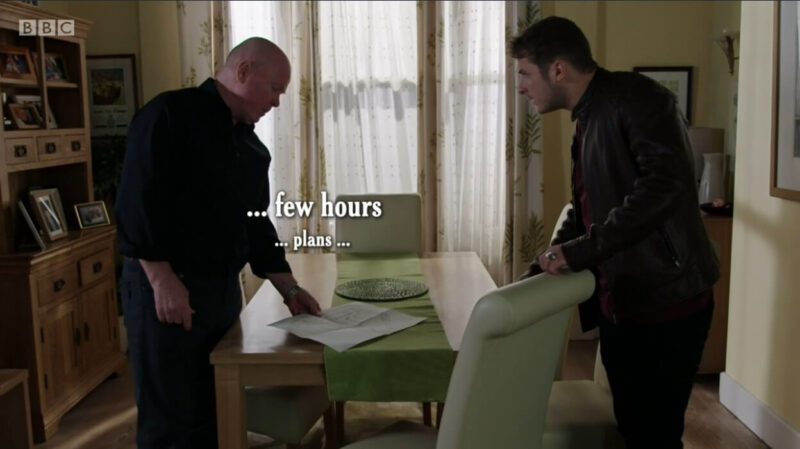
And then he asks people to slow down or he gets frustrated with them or they get frustrated with him and he’s just staring really hard at the lips and it’s just not a solution, and that’s the whole point, it’s not a solution, only picks up a few things
And Ben did really well to display that or the actor, Max Bowden. And he did really well to pick up the difficulty of lip reading.
4. Being deaf does not equal complete silence
It’s also a perfect example of how being deaf does not mean it’s complete silence.
Throughout the whole episode you hear various noise in the background, whether it’s some kind of whirring noise or a high pitched whining noise, and it’s related to tinnitus.
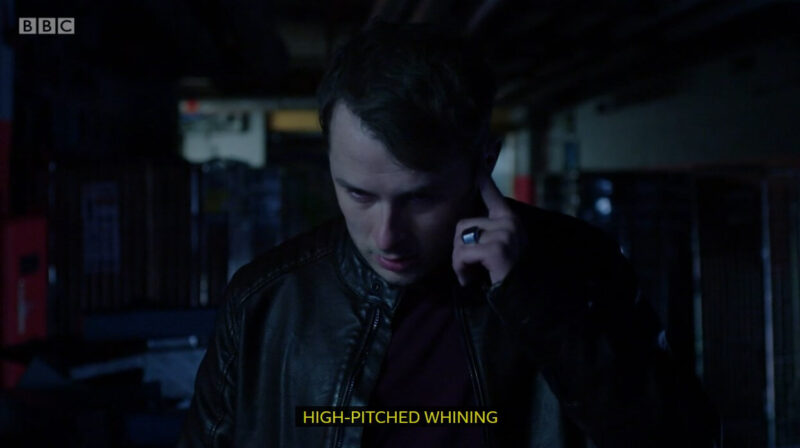
You can get the feel of what is it like to have muffled noise in the background but you can’t work out what it is. There are various different sounds distortion and you don’t know what that is either.
It just perfectly showed you that being deaf does not mean that you can’t hear anything.
There are different levels of deafness and different difficulty level and it just perfectly displays that. It’s just like the whole myth about if you are blind, it doesn’t mean that the only thing you can see is complete blackout, that’s not the case, that’s a myth, that is a complete myth, there are different levels of what people can and can’t see, just like there are different levels of what people can and can’t hear.
And in this situation it was perfectly displayed.
5. The frustration is real…
The frustration is real and you can see that with Ben.
When he is trying to get people to slow down or don’t shout or repeat, you can see that other people are frustrated with him and he frustrated with them, but also that he just can’t keep up with it.
And the mental toll catches up on him and that is so real, it happens in real life all the time, all the time.
You can see it again, emotionally, physically, mentally, Ben struggled, struggled really hard. And it looks like he is alone, he was just alone, struggling in this world, nobody gets it, nobody could understand him and because of the lack of deaf awareness, people are not able to help him, at least, they don’t want to, maybe, or their frustrated.
Whatever it is, the struggle is real. And again, it was perfectly displayed in the episode.

You can see when people got frustrated with him, they kind of wanted to get away almost, or just not bother trying as hard or they wanted to move away.
So again, the struggle is real for both sides of a party, but at the end of the day, it’s not our fault, it’s not Ben’s fault, it’s just something happens and it’s just not able to get it right the first time. And I get that. You practise and practise and maybe that’s the case for these characters, that you learn and learn and try to get better at it.
But that’s the whole point of why I talk about it, why this is a big deal to have it on TV and prime time, why you see people talking about it and talk about all these campaigns going on, it’s a big deal because the struggle is real for everyone.
And it affects the deaf people more, but it will effect you as well, because if you can’t get that message across then you are not going to win either because if you want that person to hear your message, well then you need to make it accessible.
6. Tinnitus is different for everyone
I’ve mentioned earlier about how there are different noises happening in the background when Ben is walking around different places, in the market, in a cafe, whatever it is.
And for him it was different varies of high pitched noise and the whir, and all these things, and it’s the tinnitus for most part, it is the tinnitus. It shows again, that for different people, they experience different things on what they can hear.

For example, for me, I experience a very high pitched noise when I get tinnitus, for ages. And I get that, I don’t know, maybe sometimes a few times a month, sometimes a few times a week and it is so annoying. You try to block it out of your ear but you can’t because it’s in your head and you can’t block it out.
So again, you can see in the episode that Ben was struggling really hard to cope with that, because it was more constant for him and for other people, it will be more constant. Because for me, I don’t get it as much as other people and I get different type of sound from other people.
Again, just like I said earlier, different type of deafness, different type of hearing capability, different type of tinnitus, it’s different for everyone.
That’s the whole point, it’s just not one thing for everyone, it’s just different experiences and you react differently and you can see it, again, on that episode that he struggled so hard with all these noises, especially the tinnitus and you can’t get rid of it, you just can’t.
Normally, when you watch any TV programmes and movies and film and stuff like that, you got like a background noise, for example, the sound of people speaking in the background, the general hubbub, the conversation in the background, but you can’t hear it, in terms of what that person’s saying, it’s just that you know it’s happening in the background.
7. Audio is muffled deliberately
The good thing about this episode, the very good thing actually, is that they have muffled the audio deliberately. Because you’re going through the point of view of the character, you are not hearing the full background noise.
So for example, the character was walking through a market in the street, like they had a fruit market, seafood, and meat market, and people selling different things, a typical market that you would see.
Then when you were walking through that, it just muffled background noise, you can’t hear anything. And again, it just shows that’s exactly what it is for a lot of people, even for me in a certain situation.
I love how they did that. I love how you are literally in almost like the mind and the ear, if you like, of Ben the character. Everything’s just muffled and you don’t know what is what, you don’t know what sound is coming out. It’s very, very confusing, it can be a bit overwhelming at times, because you’re not aware of what’s going on.
There was even a point where he crossed the road and he almost got hit by a car because he got distracted, but he didn’t hear the car coming either. So it just became, it was a muffled. Yeah, it was done very well from that respect as well.
8. Good demonstration of the problems with turning your back
There are typical moments where people were turning their back to Ben because they were doing something else. For example, there was one particular scene in the house where one person was making a cup of tea or something and that person is saying something to Ben.
But he does not have a clue what that person is saying because he can’t see their faces, he can’t lip read, he can’t work out what they’re saying, they’re back is towards him, and that happens, in the episode, but it happens real life.
And it’s just one of those things where if you ever encounter a deaf person, a hard of hearing person, face them, face them face-to-face, it just makes things a lot easier. If you are in another room or your back’s towards them, it’s so, so hard.
And that shows a very good example of how it was difficult for Ben and it’s difficult for all of us as well.
9. Suddenly, he’s not good enough to do a job
Part of the episode was trying to get a job done, there was some kind of heist going on and he needed to be involved with a small team to steal money or whatever, something like that.
But there was a point where he was told that he was not good enough for the job..can you guess why? Hmm, guess what, that happens to a lot of deaf and hard of hearing people too.

Because when you put in your application form and you say you are deaf, there are times and there are evidence that for employers, they not want to even think about employing that person because immediately they assume that that person’s not capable of doing the job.
And I’ve been very hesitant in the past about putting anything about being deaf in application forms because from experience it effected my success rate of getting at least an interview, it had effected it.
So if that happened to Ben, then guess what, it happens in real life because that is a genuine thing that many, many people go through when they try to get a job and then they’re told, oh no, it’s not going to be suitable for you, it’s not going to work.
You’re not going to be doing a good job because you’re deaf.
10. It’s exhausting…physically and mentally
The final thing and it’s an important one as well, if you round it all up in terms of everything that he’s going through, you can see the physical toll on him, the emotional, the mental, the psychological, all these things, it really catches up with him.
At the end of an episode, you can see through his eyes, you can see he’s so, so exhausted mentally and physically because of the extra strain that you have to put your brain through, the extra cognitive energy that you have to go through, it’s so, so hard.
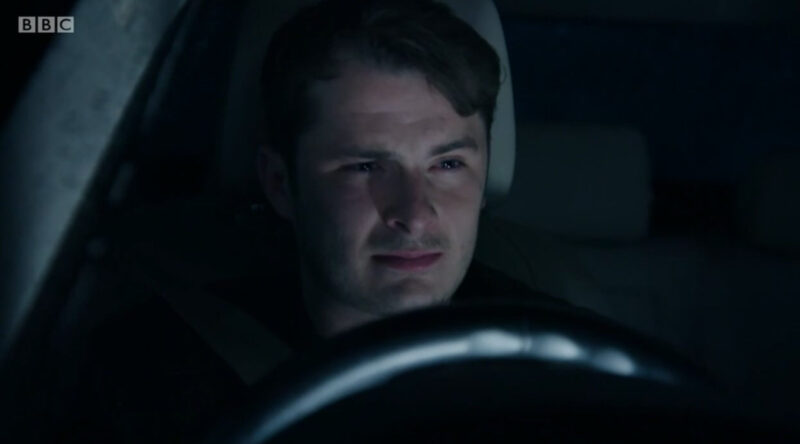
You have to really work extra hard to keep up with everything. And then there’s deaf anxiety, there’s concentration fatigue and you can see in his head, he’s like just emotional, you can see tears is coming out of his eyes and it’s really, really hard, that’s real.
That is so, so real for me and for many people. It’s so, so hard to live through that every single day. And that’s why I talk about it all the time and that’s why this episode was so important.
I have even shared it with my family, who, none of us even watch Eastenders, but it’s my way of saying, that he’s a good way to understand how it feels for all of us because it resonated with me so much.
It’s not going to be perfect, everyone’s different, that’s the main thing I say. But it’s so close and it’s a good way for them to understand from that person’s perspective, how I feel and hopefully other people get that opportunity as well, share that episode, it’s very, very good.
A few minor points to highlight
I’ve got so many positive things to say about that episode, there were a couple of maybe minor problems that I found and maybe something that could be worked on better.
1. Is Makaton or BSL used?
One is when I wasn’t sure whether BSL was used. There was a little girl, Ben’s daughter, and she was the only one doing the signing. As far as I’m aware, because I am not fluent in sign language, she was using Makaton.
And I don’t know if it’s true or not, I’d love it if someone clarified that for me in the comments and if it’s Makaton, she’s really kind of taken aspects of BSL and making it easier to use for those with different kind of disability, but it’ not BSL, it’s not British Sign Language, it’s a different type of sign language, but it’s not officially recognised.
So there are criticisms I’ve seen online on why BSL’s not used, why is it Makaton.
That needed to be clarified because I was a bit confused about that, and I’d love for someone to clarify that for me as well.
2. Closed-captions could be a bit better
The other problem I found is actually maybe not to do with the Eastenders crew, but I’ve noticed that the close-caption, again, the one that you switch on and off on TV, there were times where I felt like maybe it could have been a little bit more descriptive.
There were times in a scene where certain background sounds were obviously there, but I wasn’t sure what it is. Is it some kind of background music or is it background people speaking?
There was even a point where the caption was literally just ‘distortion’ and I don’t think that’s descriptive enough because distortion of what? It’s a result of what?
![Eastenders clip where Ben is running round a white van in the dark, with the caption [Distortion]](https://hearmeoutcc.com/wp-content/uploads/2020/06/eastenders-deaf-silent-episode-clip-4-800x448.jpg)
The only thing I could guess from that particular moment was the distortion was there were conversation going on, but there was like, voice distortion or something along that line.
And I think it would’ve been good if the close-caption was a bit more descriptive.
What is the biggest disappointment?
The big disappointment, when you see the reaction of some people on social media complaining, literally complaining, they complained about how the open captions were annoying and distracting and it’s trying to illustrate the point of, here’s what Ben can pick up.
They complained about that. They complained about how, “oh, it’s not the usual Eastenders, they’ve ruined it”, they complained about that.
They also complained about how annoying it is, those wooden noise and those whining noise and all this noise in the background, they said it’s very, very annoying for them.
Really, it’s just so sad, it’s just pointless. It’s just pathetic in a way, to complain about something that is taking up, what, 25 minutes of your life to understand what other people go through every second of every single day for the rest of their life.
And it’s really trying to make you live that experience as close as possible what that character’s going through. It’s trying to get you to really get into the scene, get into the story line and feel it, really feel it, of how that person’s feeling, and that’s what they’re trying to do, and you complain about it, it’s just useless.
It’s just ironic that people complain about something that they really don’t have to struggle with and it’s only for a very short period of time, 25 minutes (that’s how long, 25 minutes of that time) and you are complaining about it.
Just have some empathy, that’s it. Just have empathy, you understood it, you get it, moving on, because don’t worry, your precious Eastenders will come back.
And then, everything, for you anyway, will go back to normal, whereas for the rest of us, life goes on and we will have to continue fighting for the access, for the equal opportunities, for able to even access basic information, we just have to keep on fighting for that.
But don’t worry, Eastenders will be coming back to its more normal routine very soon, just calm down.
What do other people think of the episode?
You can also check out the links below of other people’s opinions on what they thought and other people who are deaf themselves, what they thought of the episode.
It’s very interesting to see what they think from their own perspective, because they have their own level of deafness, or maybe they are just mainly sign language speakers and that’s it or someone else with more hard of hearing.
There are different types and it’s just very interesting to see different people, how they feel about the episode below.
Make sure you also click on each othe tweets to look at the conversation in the threads.
For example, Alison Hendry below is a deaf BSL speaker who wears cochlear implant and shares her own thoughts
My reaction to tonight’s @bbceastenders episode 👇🏻 – I enjoyed it, it made a big impact on me! Being #deaf myself I felt it was a really good episode to show examples of the struggles I face everyday – thank you Eastenders for doing this #eastenders #deafawareness #BSL pic.twitter.com/ASgntN93Uv
— Alison Hendry (@AlisonHendry16) June 1, 2020
Liam O’Dell, a mildly deaf journalist (who I have interviewed in a podcast) has put together a thread on what he picked throughout the episode…
Loving the creative captions. That whistling sound you heard as Ben walks through the market? That’s tinnitus – I have that ringing in my ear constantly. It’s permanent, and doesn’t go away. #EastEnders
— Liam O’Dell (@LiamODellUK) June 1, 2020
…and also written an article on the Metro about it:
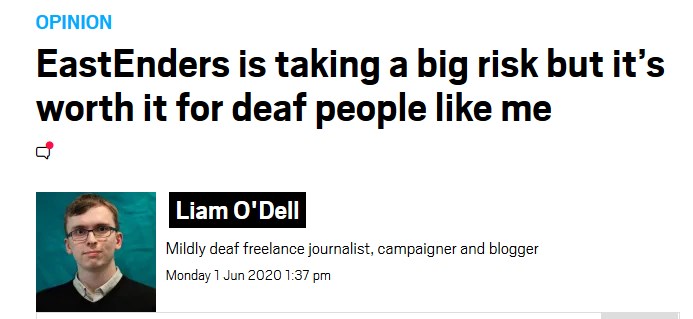
A soap journalist from the Metro also enjoyed the episode himself:
What #EastEnders has accomplished with tonight’s episode is spectacular. @MaxBowden is amazing. Don’t miss it.
— Stephen Patterson (@mr_sjpatterson) June 1, 2020
That was incredible #EastEnders I was jumping, shouting at the screen. Congratulations too all involved & an awesome performance @MaxBowden A very important episode ❤️
— Karen Ammon (@Flumps96) June 1, 2020
And an Eastenders “superfan” has also really enjoyed the episode, which was also commended by Nadia Nadarajah, who is also a deaf BSL speaker too:
I applauded for letting this happened on one of episodes. #hearingloss
— Nadia Nadarajah (@NadiaNadarajah) June 1, 2020
Love the creative captions!!!
No one beat that!!
💪🏾💪🏾💪🏾!
The importance of having the right people in the team
The big thing I have to praise though, is the crew of Eastenders, not just the actors, but also behind the scene because they got the right people involved to speak about the topic to make sure that the story line is accurate, to make sure that the character is, to the best as they can, act and feel and get their emotions out there like other deaf people go through.
And that’s really important.
And the way they did that is getting the right people involved behind-the-scene, people like Charlie Swinbourne here, who is a filmmaker, director and he’s deaf himself.

They also involved a big charity, NDCS, which is the National Deaf Children’s Society.

An actress called Rose Ayling-Ellis who is involved actually in the Eastenders as an actress herself and she had a character in there who’s trying to help Ben to find his own deaf identity.

They all played a part, they all did their own way of doing things, and it’s a testament to Eastenders making sure that they get the right people and making sure that they do the best way they can.
And this is why, when talking about a particular topic, it’s important to have the right people behind the scenes to help you.
That’s why you see all the time a major story about how a company did a branding or adverts or a programme so wrong and they didn’t totally represent the community correctly.
But then you look at who made it and you think, well, it’s quite obvious why it failed, because you didn’t get the right people from that community involved in the creation of your content.
And if you fail to do that, then you fail to get the message across and you fail to get that authentic person out there, the authentic message out there.
And it’s a testament to Eastenders, everyone involved, that they did the right thing by getting the right people involved. So well done to them.
And of course, well done to the actor Max Bowden who played the character Ben Mitchell. He’s done very well, I can’t complain about what he did. He shared a story, he listened to people it seemed, and he did it really well.
A message from @MaxBowden about tonight’s very special episode of #EastEnders. You really don’t want to miss it.
— BBC EastEnders (@bbceastenders) June 1, 2020
8.10pm on @BBCOne.
Vote for Max and everything #EastEnders in the TV Choice (https://t.co/UlqI2vnvfR) and Radio Times Awards (https://t.co/xMlOcfm0gH). pic.twitter.com/tKrkp6bshu
So thanks because of the help of everyone involved, he’s able to really portray that as a deaf character very, very well. So well done to Max and well done to everyone involved. And it’s just really good, really well done. I’m glad that it’s done this way and I hope you get the chance to see it.
For those in the UK it’s on BBC iPlayer. And it’s something that I think is really useful for you to watch.
I hope you found this episode useful, let me know what you think and let me know if you have seen it, I would love to know your thoughts as well, in the comments, in social media, it would be awesome to hear your thoughts.
And of course, if you really enjoyed this episode, make sure you hit that subscribe button on whatever platform that you’re using and it’d be so awesome for you to do that, I’d really, really appreciate it.
In the meantime, I will speak to you again soon.
Take care.
- What is ‘audism’? Plus my personal experiences of facing audism - October 27, 2021
- ‘CODA’ movie review: my thoughts on the latest deaf movie to be released - October 13, 2021
- Deafness as a ‘hidden/invisible disability’ - October 6, 2021
Leave a Reply